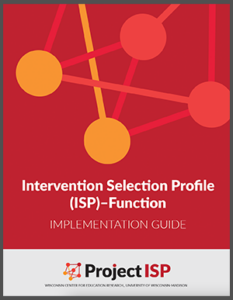
We develop and refine tools to identify and address the mental health needs of students in the classroom.

A suite of brief problem identification tools for students in need of Tier 2 support.
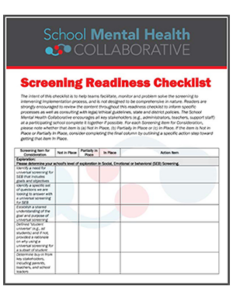
The Screening Readiness Checklist is a resource that allows school-based teams facilitate, monitor and problem solve the screening to intervening implementation process. School team can review the content throughout this readiness checklist to inform specific processes needed to implement universal screening and subsequent intervention implementation.

Mental-health Assessment and Support Cost Out Tool (MASCOT)
The Mental-Health Assessment and Support Cost Out Tool (MASCOT) compares the cost of universal screening procedures and subsequent supportive services to the costs of typical school discipline (i.e., Office Discipline Referrals, Disciplinary Meeting). The MASCOT utilizes the realistic salaries, intervention costs and disciplinary actions to simulate both the humanistic and financial cost to supporting students’ behavioral success.
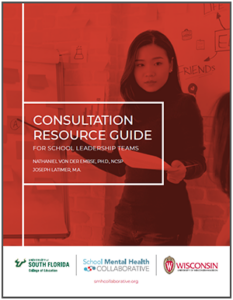
Consultation Resource Guide for School Leadership Teams
The Consultation Resource Guide is intended to provide a step-by-step outline of all activities necessary for building a screening to intervening infrastructure within school settings.
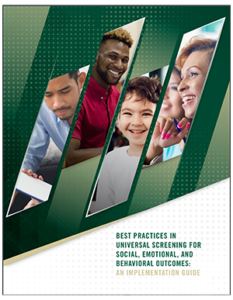
This guide summarizes the current state of research and practice related to universal screening for social, emotional, and behavioral outcomes. It also provides practical and defensible recommendations.

Internalizing Behavior Observation Protocol (IBOP)
The Internalizing Behavior Observation Protocol can be used to monitor student response to the Resilience Education Program (REP) over time.
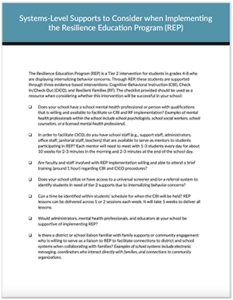
Systems-Level Supports to Consider when Implementing the Resilience Education Program (REP)
Educators should use this checklist in evaluating the appropriateness of REP for their school, while also considering readiness for implementation.

Assessment Measures to Support Student Identification and Progress Monitoring for REP
This resource includes a list of measures that can be used to either (a) identify students who would benefit from REP (e.g., universal screeners) or (b) evaluate student response to REP (e.g., progress monitors).

Check-in/Check-out Fidelity Checklists
A series of checklists to assess whether key steps in the Check-in/Check-out (CICO) intervention are completed well. When school staff consistently complete the key steps, they increase the likelihood that CICO will produce positive outcomes. The CICO Checklists can be used as part of the Resiliency Education Program or independently.

REP Resilient Families Handbook
This Resilient Families process is designed to engage parents and caregivers as co-equal partners in supporting their child. REP implementers work to support parents and caregivers in developing tools that promote their child’s social-emotional skills. Finally, the handbook helps to establish a context for families and educators to collaborate as they coordinate support for their child.

REP Cognitive-Behavioral Instruction Workbook: Grades 6-8
This student workbook includes all of the materials a student will need to progress through REP, including homework sheets, lesson worksheets, and lesson overviews. This workbook is specific to the middle school version of the curriculum (grades 6-8).

REP Cognitive-Behavioral Instruction Workbook: Grades 4-5
This student workbook includes all of the materials a student will need to progress through REP, including homework sheets, lesson worksheets, and lesson overviews. This workbook is specific to the late elementary school version of the curriculum (grades 4-5).

REP Cognitive-Behavioral Instruction Curriculum: Grades 6-8
Through five lessons in a small-group setting, students learn skills to manage their strong emotions, address negative thoughts that lead to these emotions, and problem solve within challenging social or academic situations.

REP Cognitive-Behavioral Instruction Curriculum: Grades 4-5
Through five lessons in a small-group setting, students learn skills to manage their strong emotions, address negative thoughts that lead to these emotions, and problem solve within challenging social or academic situations.
This guide summarizes the current state of research and practice related to universal screening for social, emotional, and behavioral outcomes. It also provides practical and defensible recommendations.
Consultation Resource Guide for School Leadership Teams
The Consultation Resource Guide is intended to provide a step-by-step outline of all activities necessary for building a screening to intervening infrastructure within school settings.
The primary purpose of this project is to develop and validate a social, emotional, and behavioral risk screener for early childhood. The assessment will be an online and application-based universal screening system available in both English and Spanish. It will be aligned with the Social, Academic, and Emotional Behavior Risk Screener (SAEBRS), a universal screener for K–12 settings that has been adopted in all 50 states, with the aim of supporting transition planning between early childhood and K–12 settings as well as informing intervention.
The purpose of this project was to support the development and validation of the Intervention Selection Profile (ISP), a suite of brief assessment tools to identify appropriate interventions for students in need of Tier 2 support.
Intervention Selection Profile (ISP) – Function Implementation Guide
This implementation guide provides information on how to prepare for ISP-Function use, collect ISP-Function data, and use it to inform intervention selection.
Intervention Selection Profile (ISP) – Function Observation Form
This ISP-Function Observation Form is used to monitor student disruptive behavior and four possible behavioral consequences. Observations should be conducted during class periods in which the behavior is most frequent. School staff who will utilize the ISP-Function should complete the training module before use.
Intervention Selection Profile (ISP) – Function Scoring Tool
This scoring tool calculates the average percentage of disruptive behavior as well as the average percentage of the four behavior consequences. You can print and share this resource with the student’s support team.
Mental-health Assessment and Support Cost Out Tool (MASCOT)
The Mental-Health Assessment and Support Cost Out Tool (MASCOT) compares the cost of universal screening procedures and subsequent supportive services to the costs of typical school discipline (i.e., Office Discipline Referrals, Disciplinary Meeting). The MASCOT utilizes the realistic salaries, intervention costs and disciplinary actions to simulate both the humanistic and financial cost to supporting students’ behavioral success.
The purpose of this project is to develop and validate a multi-informant decisional assessment system (MIDAS) to integrate and use multiple sources of data for accurate and efficient identification of social-emotional and behavioral (SEB) concerns in middle school students.
The Screening Readiness Checklist is a resource that allows school-based teams facilitate, monitor and problem solve the screening to intervening implementation process. School team can review the content throughout this readiness checklist to inform specific processes needed to implement universal screening and subsequent intervention implementation.
We are developing software to help MTSS teams find the best strategies for improving behavior and mental health in their schools. Our ADVICE software compares the impact and costs of Tier I/II interventions based on school size, need, and resources.




1025 W Johnson St, Suite 1078
Madison, Wisconsin 53706
Email: smhc@wcer.wisc.edu
Accessibility issues? Contact the WCER Webmaster